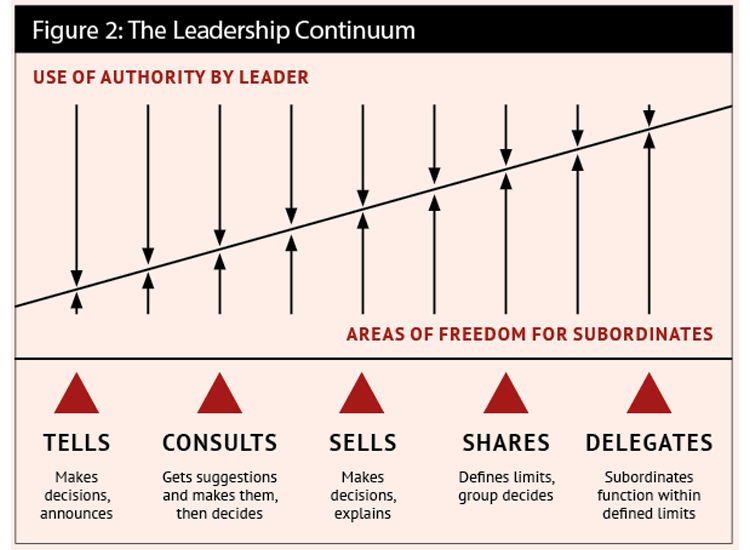Leading for change
The level of involvement depends on a number of factors. The Leadership Continuum (figure 2) describes the range of behaviours that we adopt during a process of change. At one end of the continuum, we are very directive. At the other end, we might set the ultimate goal and limitations, but allow the team to make the plan.
Three factors will affect your style of leadership and behaviour: the timescale for decision-making, leadership maturity and the level of risk. If we need to make changes quickly, the amount of team involvement tends to decline and we tend to take a directive approach as we see discussion as delaying the process which, if it is time-critical, may not be appropriate. If you have an extended period of time for a change, involving your team will allow people to engage more completely.
The maturity of our own leadership will affect how we want to involve others. If you are new in a role, you are less likely to have the confidence to involve others.
As our experience grows, we have more confidence to listen to and accept challenges from others. However, leadership maturity applies to the team as much as it does to the leader. A new team with little experience and a low level of maturity could be overwhelmed, while a group with more experience will have more to offer.
Weighing up risk
Risk is the final factor. We tend to limit involvement if we think the risks are high. For example, you wouldn’t usually involve many people if you were changing the way you manage Controlled Drugs. You would simply spell out what needs to be done.
However, when a change is lower risk – for example, if you were looking at how you might arrange the dispensary more efficiently, you might choose to encourage more involvement. It is best to try to involve your team to some extent whenever you plan some change.
Change is inevitable and to help it happen successfully and with limited stress, you should involve your team, give them time to digest it and support them as individuals as they go through it. When the team has reached its goals, it is time to celebrate success.
Pause to reflect
Think about the last time you went through a period of change. It could be something at work, or from outside work.
- Do you recognise the stages of your emotional reaction to the change?
- What could you have done to improve your response to the change and become more resilient?

